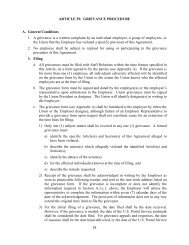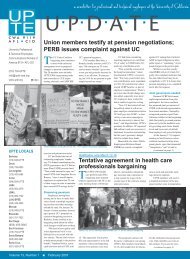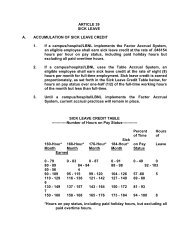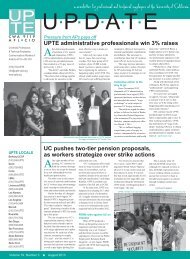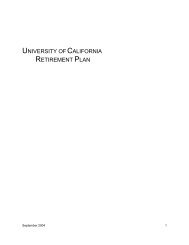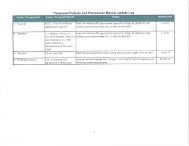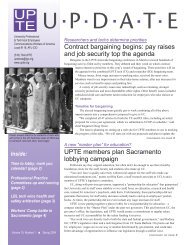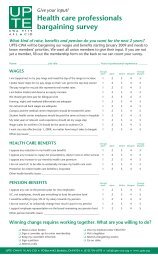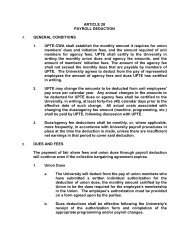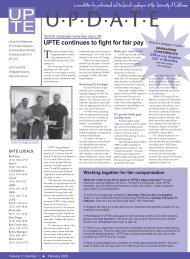Apr - UPTE-CWA
Apr - UPTE-CWA
Apr - UPTE-CWA
You also want an ePaper? Increase the reach of your titles
YUMPU automatically turns print PDFs into web optimized ePapers that Google loves.
Joe Biegner, photo<br />
UP<br />
TE<br />
University Professional<br />
& Technical Employees<br />
Communications Workers<br />
of America Local 9119,<br />
AFL-CIO<br />
(510) 704-<strong>UPTE</strong><br />
info@upte-cwa.org<br />
www.upte.org<br />
<strong>UPTE</strong> LOCALS<br />
Berkeley<br />
(510) 848-<strong>UPTE</strong><br />
Davis:<br />
(530) 759-0803<br />
Los Angeles:<br />
(310) 443-5484<br />
Irvine:<br />
(949) 854-<strong>UPTE</strong><br />
LANL:<br />
(505) 662-4679<br />
LBNL:<br />
(510) 665-7722<br />
LLNL:<br />
SPSE (affiliate):<br />
(925) 449-4846<br />
Riverside:<br />
(951) 781-7922<br />
San Diego:<br />
(619) 296-5090<br />
San Francisco:<br />
(415) 753-<strong>UPTE</strong><br />
Santa Barbara:<br />
(805) 685-3661<br />
Santa Cruz:<br />
(831) 429-<strong>UPTE</strong><br />
a newsletter for professional and technical employees at the University of California<br />
UPDATE<br />
■ ■ ■ ■ ■<br />
Benefits in jeopardy<br />
Regents move to institute retirement copays; unions<br />
organize coalition to fight back<br />
At the March 17 UC<br />
Regents’ meeting in Los<br />
Angeles, union members<br />
were loud and clear about their<br />
position on retirement and benefits<br />
changes: do not take any precipitous<br />
action given the clear fact that<br />
our pension fund is solvent and will<br />
be solvent for some years to come.<br />
Members of <strong>UPTE</strong>-<strong>CWA</strong>,<br />
CUE and AFSCME all spoke<br />
before the regents, urging them to<br />
consider options other than raising<br />
employee contributions.<br />
A few of the dozens of UC<br />
employees at the union’s benefits<br />
teach-in held <strong>Apr</strong>il 1 in Los Angeles<br />
In the second of a series of two<br />
Sacramento hearings, the<br />
Senate Education Committee<br />
grilled UC officials on Feb. 28<br />
about executive pay practices,<br />
golden parachutes for high-ranking<br />
employees, and senior managers’<br />
financially lucrative corporate<br />
board service.<br />
UC has been under heavy fire<br />
for paying executives more than it<br />
disclosed to the public, as well as<br />
failing to provide the regents with<br />
reports on legal settlements and<br />
executive compensation, since the<br />
San Francisco Chronicle began<br />
publishing a months-long series of<br />
investigative articles into UC’s<br />
practices.<br />
Practices under scrutiny<br />
At the Feb. 28 hearing, UC<br />
admitted that though it was<br />
required to provide annual reports<br />
to the regents detailing all<br />
settlements of legal claims,<br />
“We asked that no changes<br />
occur for those not represented by<br />
a union, and reminded UC that it<br />
must bargain over any changes<br />
with the system’s 70,000 unionrepresented<br />
employees,” said Cliff<br />
Fried, a UCLA staff research<br />
associate and <strong>UPTE</strong>’s executive<br />
vice president.<br />
At the meeting, the regents<br />
approved a plan to increase<br />
contribution rates gradually over<br />
time to 16 percent of covered<br />
earnings, beginning in July 2007,<br />
while acknowledging that changes<br />
for union-represented employees<br />
are subject to bargaining.<br />
UC has floated some alarming<br />
proposals to dramatically change<br />
benefits and retirement plans.<br />
<strong>UPTE</strong> has met with UC several<br />
times to clarify its proposals, but<br />
UC has still not answered most of<br />
our questions. Here is what we<br />
know at this time.<br />
Pension fund. UC claims the<br />
pension fund will require 16%<br />
annual contributions to stay fully<br />
funded. No agreement has been<br />
made about how much of this<br />
could be paid by UC and how<br />
much by employees. UC wants to<br />
exclude new employees from the<br />
current defined benefit plan and<br />
offer them an inferior plan, a move<br />
which could undermine the<br />
stability of the current plan.<br />
Retiree health benefits. New<br />
accounting standards require UC<br />
to report anticipated costs of<br />
retiree health benefits. UC’s<br />
consultants estimate this liability at<br />
$7.6 billion. UC has hinted that a<br />
15% contribution might be needed<br />
to cover this liability, or that<br />
alternatively, retiree health benefits<br />
could be cut.<br />
Employee benefits. UC has<br />
said it wants to reduce its contribution<br />
to employee benefits over the<br />
next several years from 97% to<br />
68%, which would mean increasing<br />
employees’ contributions from an<br />
average of $68 to $337 per month.<br />
“That would amount to a huge<br />
pay cut for employees,” notes Fried.<br />
Unions organize fightback<br />
UC’s move to cut benefits and<br />
retirement is not unique. Pensions,<br />
health care and retiree health<br />
benefits are under attack from<br />
coast to coast.<br />
“The situation at UC is a<br />
combination of these national<br />
attacks, bad management and<br />
investment decisions by the<br />
regents, and the national health<br />
care crisis,” notes Lisa Kermish,<br />
<strong>UPTE</strong>’s vice president and a staff<br />
professional at UCB. “It’s going to<br />
be a long, complex, multi-layered<br />
battle that’s going to take place in<br />
the workplace, in the Legislature,<br />
and in the community.”<br />
UC unions are firing the first<br />
salvo by jointly circulating<br />
petitions demanding that UC fairly<br />
fund the pension plan, utilizing all<br />
available UC resources. “Even if<br />
there is a need to beef up contributions,<br />
there’s no reason why<br />
employees should bear the burden<br />
alone,” said Jelger Kalmijn,<br />
<strong>UPTE</strong>’s president, “especially<br />
since the declines in pension<br />
funding have happened in part due<br />
to UC’s poor management.”<br />
Kalmijn and other union<br />
leaders say UC has resources it<br />
could use to bolster the fund,<br />
before taking money out of the<br />
already far-below-market paychecks<br />
of UC workers. The<br />
petition also calls on UC to<br />
abandon its plans for a two-tier<br />
retirement plan – which would<br />
make new employees second-class<br />
employees and undermine the<br />
system as a whole – and to retain<br />
full retiree health benefits.<br />
Sign the petition online at<br />
, or obtain printed<br />
copies from your local. Coalitions<br />
of staff, faculty, students and retirees<br />
have formed at most campuses and<br />
welcome new members. To get<br />
involved, contact your <strong>UPTE</strong> local.<br />
Legislators criticize UC for lack of disclosure on executive perks<br />
it had failed to do so.<br />
“It’s embarrassing,” said<br />
Republican Senator Abel<br />
Maldonado of Santa Maria (Santa<br />
Barbara County), a member of the<br />
committee. “There is no accountability.”<br />
The admission from UC came<br />
only when the Chronicle requested<br />
the reports and UC could not<br />
produce them. In the first committee<br />
hearing on Feb. 8, the university<br />
was criticized for a secret<br />
settlement reached last year with<br />
former UC Davis vice chancellor<br />
Celeste Rose. In exchange for<br />
Rose dropping her claims of racial<br />
and gender bias, UC agreed to give<br />
her $50,000 plus a job that pays<br />
$205,000 a year with no job<br />
description or regular duties.<br />
A UC spokesperson promised<br />
senators that UC would reveal all<br />
such settlements in the future.<br />
Non-monetary compensation<br />
is also an issue, such as the<br />
$30,000 UC spent for a dog run at<br />
UCSC chancellor Denice Denton’s<br />
house. The improvements were<br />
part of her recruitment package,<br />
according to the March 30<br />
Chronicle, and included remodeling<br />
three bathrooms, two guest<br />
rooms, and purchasing a new<br />
SubZero refrigerator and other<br />
appliances. The project cost up to<br />
$600,000, though it wasn’t clear<br />
whether the entire cost was part of<br />
Denton’s package. Denton’s<br />
declared salary is $283,000.<br />
Hiding from the public<br />
Senators were also frustrated<br />
with UC’s old information on<br />
executives’ total compensation and<br />
paid service on corporate boards of<br />
directors. No reports on these<br />
topics have been produced since<br />
2002-2003.<br />
The Chronicle noted that even<br />
when the reports exist, they are not<br />
readily available to the public.<br />
“UC doesn’t post the reports on its<br />
web site, for instance,” wrote<br />
reporters Todd Wallack and Tanya<br />
Schevitz in the February 28<br />
edition. “And it took the university<br />
more than a month to provide a<br />
copy of its most recent report on<br />
outside board service, even after<br />
[we] filed a Public Records Act<br />
request for the document.”<br />
This is a fact UC’s unions<br />
know well, because the university<br />
routinely stalls on providing<br />
information needed in bargaining.<br />
Union reps have repeatedly<br />
brought UC’s lack of disclosure to<br />
the attention of legislators in prior<br />
legislative hearings on UC labor<br />
relations, laying the groundwork for<br />
much of the current investigation.<br />
As Senator Maldonado said of<br />
the issue: “They are violating the<br />
public trust….They need to be on<br />
their game and disclose everything<br />
they have. Disclose, disclose,<br />
disclose.”<br />
Volume 12, Number 2 ■ <strong>Apr</strong>il 2006
Organizing for justice<br />
San Diego union<br />
president wins job back<br />
Demonstrating for<br />
immigrants’ rights<br />
A US House bill on immigration has<br />
sparked a fury of protests across the<br />
country. In one of the largest demonstrations<br />
in recent US history, an<br />
estimated 500,000 immigrants and<br />
their supporters turned out in Los<br />
Angeles on March 25, while others<br />
held rallies from Boston to San Diego.<br />
HR 4437, passed last December by the<br />
House, would make being an undocumented<br />
immigrant a felony. It also<br />
targets religious and community groups<br />
who provide assistance for undocumented<br />
workers and their families, and<br />
calls for the construction of a 700-mile<br />
fence along the U.S.-Mexico border. In<br />
the wake of the demonstrations, the<br />
Senate Judiciary Committee rejected<br />
this mean-spirited approach, and is<br />
currently debating other approaches to<br />
immigration reform.<br />
Some 50 activists began a hunger<br />
strike at San Francisco’s federal<br />
building on March 21, part of a weeklong<br />
series of events including<br />
marches, rallies and candlelight vigils.<br />
Legendary United Farm Workers union<br />
co-founder Dolores Huerta told<br />
supporters, “It’s time we said, ‘You are<br />
here, we embrace you as citizens.’”<br />
The hunger strikers called for earned<br />
legalization for immigrants and a guest<br />
worker program to allow workers to<br />
enter the country legally.<br />
David Bacon, photo<br />
Hunger strikers and their supporters at<br />
the San Francisco Federal Building<br />
protest anti-immigrant legislation<br />
After a long legal battle, <strong>UPTE</strong>’s<br />
local San Diego president, Carolan<br />
Buckmaster, has been reinstated at<br />
her job as a staff research associate at the<br />
campus’ Cancer Center. Buckmaster has<br />
received back all the vacation, sick leave,<br />
retirement credit and other benefits she is<br />
owed, and says the case shows “how<br />
important it is to organize UCSD workers.”<br />
UC had illegally dismissed Buckmaster<br />
for her union activities, saying she had<br />
broken rules about when union activists<br />
could visit employees on the job. <strong>UPTE</strong><br />
immediately challenged the move, maintaining<br />
that her organizing activities were fully<br />
protected. The union filed a grievance as well<br />
as an unfair labor practice charge with the<br />
state’s Public Employment Relations Board.<br />
It was the threat of an independent<br />
arbitrator deciding the case that convinced<br />
UC to reinstate Buckmaster. “They knew<br />
they would lose, so they gave in,” she said.<br />
Her colleagues at the Cancer Center<br />
(pictured at right), as well as campus-wide<br />
and across the state, played an important<br />
role, writing letters and signing petitions on<br />
her behalf.<br />
“UC is trying to stop the union from<br />
talking to workers,” said <strong>UPTE</strong>’s president<br />
Jelger Kalmijn. “What are they afraid of?<br />
Perhaps it is that Carolan has been one of<br />
the most consistent activists reaching out to<br />
UCSD researchers to make sure we have a<br />
union that truly speaks for all of us.”<br />
UCSD’s poor track record<br />
A medical researcher for 25 years,<br />
Buckmaster arrived at UC from Australia in<br />
1990, specifically to work at UCSD’s<br />
renowned Cancer Center. Little did she<br />
know that after years of dedication to her<br />
UC work, she’d be in a battle to keep her<br />
job, due to the particularly anti-union slant<br />
of UCSD’s labor relations department.<br />
“Labor Relations at UCSD is unlike<br />
that of the other campuses,” she explained.<br />
“Ours is extremely vindictive and obstructionist,<br />
with a long record of selecting union<br />
presidents as their target, but their strategy<br />
was a dismal failure,” said Buckmaster. She<br />
called it a “pathetic attempt” to scare her<br />
colleagues away from supporting the union;<br />
rather it has “achieved the opposite.”<br />
Buckmaster became active in the union<br />
during the 1996 vote for <strong>UPTE</strong> representation,<br />
running for office and also learning to<br />
be a steward, which she says, “has been one<br />
of the most rewarding roles of my life. To<br />
empower and assist fellow employees in<br />
achieving justice and resolution is a great<br />
reward and one of the main values of a<br />
union in my mind.”<br />
Now formally reinstated, Buckmaster is<br />
planning to take a leave from her UC<br />
position for union business, as allowed under<br />
the <strong>UPTE</strong> contract, which will permit her to<br />
continue building the union. She wishes to<br />
thank everyone across the state that supported<br />
her, from petition cards and emails, to<br />
personal expressions of support. “You helped<br />
me get through the difficult times to the<br />
inevitable joy of vindication,” she said.<br />
Solidarity works!<br />
Carolan Buckmaster<br />
(third from left) with her<br />
coworkers (left to right):<br />
John Faranial, Melinda<br />
Stafford, Bernie Etzel,<br />
Karen Saye-Francisco,<br />
and Mercedes<br />
Garcia-Mohr<br />
HX team prepares<br />
for bargaining<br />
<strong>UPTE</strong>-<strong>CWA</strong>’s health care professionals’<br />
(HX) bargaining team has submitted initial<br />
proposals to UC for a new contract. The<br />
proposals are aimed at improving wages and<br />
working conditions, and making the system<br />
fairer for everyone.<br />
Overwork and understaffing is a major<br />
problem for many health care professionals.<br />
“When we cannot do our jobs properly, our<br />
patients suffer. At times the workloads are<br />
just not manageable,” explains bargainer<br />
Wendi Felson, a clinical lab specialist at<br />
UCSF. Problems include too many patients<br />
to cover, too many tests to run, the difficulties<br />
of using sick leave and vacation, or even<br />
having weekends and holidays off.<br />
Below market compensation and a lack<br />
of fairness are other areas needing improvement.<br />
Health care professionals have told<br />
the union they want to focus on goals such<br />
as annual step increases based on years of<br />
experience in the field, and equitable pay at<br />
all medical centers. They also want comparable<br />
pay to employees doing similar work<br />
outside UC, and like other UC employees,<br />
are working to prevent increases in the cost<br />
of benefits and retirement.<br />
Professional development opportunities<br />
are too few and far between. “Our team has<br />
also proposed important additions to training<br />
and development opportunities, and<br />
proposed an article guaranteeing fair and<br />
respectful treatment,” said Bob Dawson, a<br />
bargaining team member from UC Berkeley.<br />
New team elected<br />
HX employees elected a new 7-member<br />
bargaining team earlier this year. Felson, the<br />
representative from UCSF, said her campus<br />
has one of the largest groups of HX workers.<br />
“I feel a real sense of responsibility to fight<br />
for a better contract. We have a great team<br />
and a wonderful group of members to stand<br />
behind it,” Felson told the Update.<br />
Chairing the bargaining team is Ellen<br />
West of <strong>CWA</strong> District 9. “In my work as a<br />
union rep since 1977,” she said, “I’ve<br />
bargained many contracts, and I’m looking<br />
forward to negotiating with this great team.”<br />
Berkeley member Bob Dawson, a<br />
clinical lab specialist, says his aim is to<br />
improve staffing ratios and salary inequities,<br />
and “get the HX unit on automatic steps.”<br />
Bargaining team member Sheila Stittiams, a<br />
clinical social worker at UCSD, wants a<br />
contract that is “truly reflective of the hard<br />
work of our membership, and which<br />
includes fair wages, maintaining our<br />
benefits, and a safe work environment.”<br />
Also on the team are Larry Freed, a<br />
clinical social worker from Irvine, and<br />
clinical lab specialists Sue McCormick<br />
(Davis) and Cindy Yuge (Los Angeles).<br />
Members of the team want to hear<br />
questions and concerns from health care<br />
workers. Contact information, as well as the<br />
latest bargaining news, is at .<br />
RX/TX committees<br />
win certification pay<br />
While <strong>UPTE</strong>-represented technical<br />
(TX) and research (RX) employees are<br />
enjoying pay raises averaging over 13%<br />
under their new three-year contract, they<br />
have also turned their attention to issues of<br />
parking, hazardous work and pay equity.<br />
The contract granted local committees<br />
the power to “meet and confer” on these<br />
issues with UC reps at the campus and<br />
systemwide levels. <strong>UPTE</strong> is currently<br />
surveying members to ask what improvements<br />
they would like to see in these three<br />
areas.<br />
“Parking is crucial at some campuses,<br />
but pay is the biggest thing overall,” reports<br />
Kevin Rooney, a UCSF tech and <strong>UPTE</strong>’s<br />
RX/TX coordinator. Rooney says members<br />
are volunteering to work on these committees,<br />
which will exist at each campus<br />
according to local interest.<br />
One victory has already been won.<br />
Animal technicians and animal health<br />
technicians at some campuses will now be<br />
eligible for “certification pay” – essentially,<br />
extra pay for training that they have<br />
completed. A monthly stipend will be paid to<br />
the employee by UC after completion of the<br />
American Association of Lab Animal<br />
Scientists’ certification program. “If certified<br />
at the first level, they’ll get $50 extra per<br />
month, and at the next two levels, the<br />
stipend rises to $100 a month,” said Rooney.<br />
<strong>UPTE</strong> reps are negotiating a similar<br />
deal for staff research associates at UCSF<br />
certified by their professional organization.<br />
The process could be precedent-setting for<br />
other campuses and job titles.<br />
2 | UPDATE
Around the state<br />
New toxic discoveries at UC’s<br />
Richmond Field Station<br />
<strong>UPTE</strong> lobbies Congress over lab<br />
contracting; lawsuit in the works<br />
In May 2005, when Cal/EPA bowed to<br />
community pressure and made its<br />
Department of Toxic Substances<br />
Control (DTSC) “the lead regulatory<br />
oversight agency” for toxic sites located<br />
next to each other on the bay in southeast<br />
Richmond, including UC Berkeley’s<br />
Richmond Field Station (RFS), a number of<br />
UC offices moved into high defensive<br />
mode. When a coalition of six UC unions<br />
formed a safety committee and joined<br />
forces with concerned residents and others<br />
in Richmond, UC strengthened its armor.<br />
Reading UC and other sources of<br />
information about Richmond’s contaminated<br />
sites leads to an eerie feeling of living<br />
in parallel universes. UC has more than 200<br />
employees working at RFS who are<br />
concerned for their health and safety. On<br />
March 17, UCB Labor Relations sent a<br />
barely readable fax to CUE’s chief steward<br />
in response to an information request,<br />
claiming that the contamination “poses no<br />
significant health risks to employees<br />
working on site.”<br />
Contamination remains<br />
The California Cap Co. was supposed<br />
to have cleaned up the site before handing it<br />
over to UC. According to a UC consultant’s<br />
report, it didn’t. Moreover, only 31<br />
sampling locations were selected in the<br />
uplands (non-marshy) parts of the site.<br />
Although UC has cleaned up part of the<br />
site, other parts remain to be tested.<br />
In January, the state and Contra Costa<br />
County health services departments issued a<br />
second “Provisional Joint Health Statement<br />
Summary” and noted “limitations” in the air<br />
assessments that have been done. Although<br />
they haven’t found “short-term exposures at<br />
the levels” that would result in “noncancer”<br />
health problems, they added two cautions:<br />
1) the data were collected to monitor shortterm<br />
exposures for workers doing<br />
remediation work (who can be expected to<br />
have protective equipment), not for people<br />
who work or live nearby; and 2) no one<br />
knows the effects of low-level exposure to<br />
multiple contaminants. The health specialists<br />
recommended setting detection limits in<br />
future sampling “as low as feasible to<br />
ensure to allow for the best opportunity to<br />
understand the air quality in the area and<br />
the potential impacts on people.”<br />
When the unions asked specifically<br />
about plans for testing the groundwater and<br />
soil gas near Building 478 (the former<br />
Forest Products Lab and proposed new site<br />
of the Facilities/Operations Department,<br />
which is close to the Zeneca border and<br />
UC’s main gate), UC wrote that “Building<br />
478 is not being adversely impacted by<br />
contaminants in the Zeneca groundwater<br />
plume.”<br />
But as one health expert explained,<br />
“Air monitoring is the technique used in<br />
regular industrial hygiene, where the<br />
chemical originates inside the building<br />
itself. Air monitoring results are notorious<br />
for going up and down tremendously,<br />
depending on when and where you take<br />
them, and how the ventilation is working at<br />
that moment. So, a sample or two showing<br />
‘none detected’ is good, but doesn’t rule out<br />
the possibility that the next sample will<br />
show something. Soil-gas monitoring is a<br />
technique used for waste sites. . . . [I]t is<br />
much more reliable for telling us whether<br />
the chemical is there, or is it not there, in the<br />
ground. If it is not there, we can stop<br />
worrying about where it is going next inside<br />
the building.”<br />
In early March DTSC ordered “extensive<br />
new tests looking for radiation, dioxin,<br />
asbestos, hexavalent chromium, cyanide,<br />
methyl mercury and other hazardous<br />
substances” on the site next door to RFS<br />
(Berkeley Daily Planet, March 10, 2006).<br />
Elevated groundwater levels of trichloroethylene<br />
(TCE), tetrachloroethylene (PCE), and<br />
polychlorinated biphenyls (PCBs) – volatile<br />
organic compounds that are suspected<br />
carcinogens – have been found very close to<br />
the main gate of RFS, and it is not yet clear<br />
whether it is flowing towards the bay or<br />
towards UC’s property. Soil and groundwater<br />
sampling was to begin on March 9 for<br />
the next 30 days using two different<br />
methods (known as split-sampling).<br />
The search for radiation was prompted<br />
by a recent discovery of a superphosphate<br />
fertilizer plant alongside the RFS/Zeneca<br />
border, which used radioactive ore and may<br />
also have been the site of uranium testing by<br />
the federal government. A DTSC toxicologist<br />
expressed concern that “phosphate<br />
production could have produced increased<br />
concentrations of radioactive compounds in<br />
the slag (waste) generated by the process,”<br />
and “may still be present on the site.”<br />
Reading the UC Berkeley “RFS<br />
Remediation and Restoration Project Fact<br />
Sheet” gives the impression that all the<br />
cleanup in the area is proceeding smoothly<br />
and there is no cause for concern.<br />
<strong>CWA</strong> discusses<br />
its future<br />
What can labor activists to do more<br />
effectively respond to attacks on pay,<br />
pensions and organizing rights?<br />
That’s the question that the Communications<br />
Workers of America (<strong>UPTE</strong>’s parent<br />
union) “Ready for the Future” discussion<br />
seeks to answer. Dialogue about the union’s<br />
strategies and structure are occurring in<br />
<strong>CWA</strong>-affilated locals, including <strong>UPTE</strong>, as<br />
well as online at .<br />
Much discussion is revolving around<br />
the concept of fostering “activist unions,”<br />
where members and stewards are empowered<br />
to take on representation, organizing<br />
and legislative work.<br />
If you’d like to be part of the dialogue,<br />
contact your <strong>UPTE</strong> local or check out the<br />
website above. As a result of the union-wide<br />
process, <strong>CWA</strong> expects to release a new<br />
strategic plan this summer.<br />
Adelegation of four high-level<br />
<strong>UPTE</strong> representatives spent three<br />
days on Capitol Hill last week,<br />
visiting legislators and government officials<br />
about the effects of contracting out the UCrun<br />
national laboratories at Los Alamos and<br />
Livermore.<br />
The group included Jeff Colvin,<br />
legislative co-chair of the <strong>UPTE</strong>-affiliated<br />
Society of Professionals, Scientists and<br />
Engineers (SPSE) at Lawrence Livermore<br />
National Laboratory (LLNL); Manny<br />
Trujillo, <strong>UPTE</strong> president at Los Alamos<br />
National Lab (LANL); Jelger Kalmijn,<br />
<strong>UPTE</strong>’s systemwide president; and Rodney<br />
Orr, <strong>UPTE</strong>’s legislative coordinator.<br />
The <strong>UPTE</strong> lobbying team asked<br />
Congress to delay the transition to the new<br />
corporate contractor at LANL to allow<br />
employees more time to understand and<br />
decide among their options for retirement<br />
plans, particularly since numerous questions<br />
remain as to whether the new<br />
contractor’s site-specific pension plan is<br />
“substantially equivalent” to the UC<br />
Retirement Program (UCRP) as was<br />
required in the LANL Request for Proposals.<br />
The LNLL contract will also shortly be<br />
out to bid.<br />
Kicked out of UCRS<br />
While a new management<br />
contract for Los Alamos National Laboratory<br />
(LANL) made dramatic headlines late<br />
last year, the<br />
lab’s 10,000<br />
employees now<br />
face the possible<br />
loss of their UC<br />
pensions. Under<br />
the new<br />
contract, they<br />
will no longer<br />
be UC employees<br />
but will<br />
work for Los<br />
Alamos<br />
National<br />
Security, LLC, a<br />
partnership of<br />
UC, Bechtel,<br />
Washington<br />
Group and<br />
BWX.<br />
The<br />
employees will<br />
no longer accrue service credit with UCRS.<br />
If they retire and lock in their retiree health<br />
benefits, they lose their right to a job at the<br />
new employer. If they do not retire, they<br />
can either have their public pension<br />
converted to a private “clone plan,” or<br />
become an inactive UCRS member and be<br />
put into the new company’s “market-driven<br />
plan.” This means that many employees<br />
now have decades of service credit on the<br />
chopping block.<br />
In addition to no longer being an<br />
active part of UCRS, the new employer<br />
will hire all workers as “at will” employees,<br />
which means they can be fired without<br />
any reason, at any time.<br />
Cooperation from legislators<br />
<strong>UPTE</strong> reps also pressured the<br />
Deparment of Energy (DOE), which<br />
oversees the national labs, to write a<br />
different Request for Proposals for the<br />
LLNL management contract, so that LLNL<br />
employees will not have to face the same<br />
dilemma of retaining their vested interest<br />
in UCRS or retaining their employment,<br />
and will not have to face being converted<br />
to “at will” status.<br />
“We got agreement for concerted and<br />
cooperative effort on our issues from both<br />
senators from both states (California and<br />
New Mexico), as well as from the key<br />
legislators in both parties in the House,”<br />
reported Colvin. “By the time we showed<br />
up at Senator Feinstein’s (D-CA) office in<br />
the afternoon of the second day, the key<br />
staffer there had already talked to the<br />
legislative director from Senator<br />
Bingaman’s (D-NM) office with whom we<br />
had talked the day before. All the legislators<br />
are now working together on our<br />
behalf,” he said.<br />
The team also got assurance from a<br />
key DOE official that union concerns<br />
would be accommodated in the LLNL<br />
Request for Proposals.<br />
Jelger Kalmijn, photo<br />
<strong>UPTE</strong>’s Rodney Orr, Jeff Colvin and Manny Trujillo in front of the Capitol<br />
After consulting with legal advisors,<br />
the <strong>UPTE</strong> reps began plans to file a<br />
lawsuit, seeking an immediate injunction<br />
to stop the LANL management transition.<br />
“<strong>UPTE</strong>’s attorneys advise us that the<br />
choice being offered LANL employees in<br />
the transition may violate as many as three<br />
federal laws,” said Colvin, adding that the<br />
team informed all the officials visited in<br />
DC that the union may be taking legal<br />
action. Stay tuned for more information.<br />
UPDATE | 3
Scott Harris, photo<br />
In the news<br />
Regents vote to<br />
divest from Sudan<br />
Responding to the continuing genocide<br />
in the Darfur region of Sudan, the UC<br />
Regents voted unanimously at their March<br />
16 meeting in Los Angeles to divest from<br />
companies that do business there.<br />
The move comes after a student-led<br />
group, the UC Sudan Divestment<br />
Taskforce, began pressuring UC to take<br />
action more than a year ago. Many<br />
legislators, human rights groups, and<br />
unions (including <strong>UPTE</strong>-<strong>CWA</strong>) had<br />
endorsed the campaign.<br />
The total amount to be divested is not<br />
yet known, but estimates put the figure in<br />
the tens of millions of dollars. It is the<br />
largest university portfolio targeted by<br />
activists to date, and the first time a public<br />
university has voted to divest, according to<br />
Jason Miller, a UCSF student and co-chair<br />
of the UC Sudan Divestment Taskforce.<br />
“Today’s vote puts the university on<br />
the right side of history,” said Adam<br />
Rosenthal, the student regent who first<br />
introduced the divestment issue at the<br />
November 2005 meeting. He added that it<br />
was only the second time in UC history<br />
that the regents have voted to take a stand<br />
on an international human rights issue. In<br />
1986, UC divested its funds from firms<br />
doing business in apartheid South Africa,<br />
after a long campaign by a broad coalition<br />
of activists. In 2001, it divested funds in<br />
tobacco companies.<br />
The UC campaign is part of a nationwide<br />
movement for Sudanese divestment,<br />
and the regents’ action is already influencing<br />
state policy on the issue. State<br />
Assemblymember Paul Koretz (D-West<br />
Hollywood) says he will revise his own<br />
legislation urging CalPERS to use UC’s<br />
plan as a model in its possible divestment<br />
of state public employee retirement funds<br />
from Sudan.<br />
“This will make a very dramatic<br />
difference,” Koretz told the San Francisco<br />
Chronicle. “I believe that it will ultimately<br />
save tens of thousands of lives.”<br />
UC students win back<br />
$33 million in fees<br />
A San Francisco judge has ruled that<br />
UC breached its contract with students<br />
when it raised fees, and ordered it to pay<br />
back $33.8 million to some 47,000 students.<br />
Most of the award will go to a group of<br />
9,000 professional school students in law,<br />
business and medicine. Warren awarded<br />
about $28 million to that group, including<br />
interest and $23,901 in fees, while smaller<br />
amounts were designated for other graduate<br />
students and undergraduates who suffered<br />
financially from UC’s charges.<br />
All were enrolled in 2002 and 2003<br />
when UC explicitly stated in its catalogs<br />
and brochures that future fee increases<br />
would only apply to new students. UC<br />
breached its contract for those students,<br />
according to San Francisco Superior Court<br />
Judge James Warren.<br />
The decision “proves what we’ve been<br />
saying all along — that UC can’t balance its<br />
budget on the backs of students,”<br />
Mohammed Kashmiri, a student at<br />
Berkeley’s Boalt Hall School of Law who<br />
initiated the class action lawsuit, told the<br />
San Francisco Chronicle.<br />
Fees have skyrocked for students,<br />
particularly in business and law schools. In<br />
2002-2003, they stood at about $6,000; by<br />
fall 2005, professional school students paid<br />
$15,258.<br />
Students won’t be seeing their refunds<br />
any time soon, however, because UC is<br />
appealing the decision.<br />
Organizing for single<br />
payer health care<br />
The benefits issues that UC employees<br />
face (see story page 1) are part of a larger<br />
fight for public health care coverage.<br />
That was evident on February 23,<br />
when over 200 people crowded into the<br />
historic Los Angeles City Council chambers<br />
for a “Citizen Congressional Hearing on<br />
National Health Care.” The grassroots<br />
hearing was chaired by Congresswoman<br />
Diane Watson (D-Los Angeles), with<br />
Congressman Xavier Becerra (D-Calif.)<br />
participating, and brought together a broad<br />
array of concerned residents, including the<br />
uninsured, union members, health care<br />
workers and retirees.<br />
Family medicine resident Anje Van<br />
Berkelaer testified that many of her<br />
uninsured patients find themselves using<br />
emergency rooms for care. “Universal health<br />
coverage is the decent thing to do,” she said.<br />
Many backed the new single payer<br />
“Medicare for all” system proposed by<br />
Congressman John Conyers in pending<br />
federal legislation, HR 676. The bill would<br />
create a publicly financed, privately<br />
delivered health care program that uses the<br />
already existing Medicare program by<br />
expanding it to all US residents. It would<br />
ensure access to health care services<br />
regardless of employment status or income.<br />
Under HR 676, a family of three<br />
making $40,000 per year would spend<br />
approximately $1,600 per year for health<br />
care coverage, down from the current<br />
average of over $9,000 per year. Employer<br />
costs would be reduced by as much as half.<br />
For more information about HR 676,<br />
see .<br />
UP<br />
TE<br />
University Professional<br />
& Technical Employees<br />
Communications Workers of America<br />
Local 9119, AFL-CIO<br />
PO Box 4443<br />
Berkeley, CA 94704<br />
■<br />
(510) 704-<strong>UPTE</strong><br />
info@upte-cwa.org<br />
www.upte.org<br />
Amy Newell, photos<br />
Newly elected leaders of<br />
<strong>UPTE</strong>’s Santa Cruz local,<br />
after being sworn into<br />
office by <strong>UPTE</strong> president<br />
Jelger Kalmijn. Front row,<br />
left to right: Janet Bryer<br />
(trustee), Jessica Hayden<br />
(board member), Ethan<br />
Mora (secretary). Back<br />
row, left to right: Lance<br />
Bracht (board member),<br />
Sean McStay (vice<br />
president), Susan Arnold<br />
(treasurer), Phil Johnston<br />
(local president), Jelger<br />
Kalmijn (<strong>UPTE</strong><br />
systemwide president)<br />
Santa Cruz local wins retroactive pay awards<br />
<strong>UPTE</strong> leaders at UCSC moved quickly after discovering that the raises called for by<br />
the new RX and TX contracts would be paid much later than at other UC campuses,<br />
and that some UCSC staff might lose out altogether on the retroactive pay increase<br />
as a result.<br />
<strong>UPTE</strong> Local 3 President Phil Johnston, surrounded by half a dozen other <strong>UPTE</strong> leaders,<br />
brought this injustice directly to the attention of Chancellor Denice Denton at a winter staff<br />
forum. He told the chancellor that while seven other UC campuses were issuing the increases<br />
in March, the delay at UCSC meant economic hardship and added “insult to injury for those<br />
people who will be laid off or reclassified before the payout date, and who therefore will not<br />
receive either the wage increase or the retroactive pay owed to them for five months already<br />
worked.”<br />
The chancellor responded that she had been generally pro-worker in her tenure at UCSC<br />
but was unaware of this particular problem. She recognized a senior manager from the Staff<br />
Human Resources department who said they had encountered technical difficulties in<br />
implementing the raises.<br />
Emergency negotiations successful<br />
Union leaders met in an emergency session two days later with representatives of the<br />
Labor Relations and Staff Human Resources departments.<br />
While the increases won’t be paid out on an<br />
earlier schedule due to technical problems,<br />
<strong>UPTE</strong> organizer Amy Newell told the Update<br />
that an agreement was reached to make sure that<br />
no one loses out on the five months of retroactive<br />
pay increase because of UCSC’s late<br />
payment. Instead of having to be on the payroll<br />
“on the date of payment” of the retroactive<br />
increase, UCSC agreed that anyone on the<br />
payroll as of March 1 will receive the 3%<br />
Matt Salcido and Katharine Van Horn<br />
increase back to Oct. 1, 2005. “This means that<br />
anyone laid off, retiring or reclassed out of the research and technical units between March 1<br />
and May 1 will receive five months of back pay that they otherwise would have lost out on –<br />
a big victory,” said Newell.<br />
Katharine Van Horn, an SRA II retiring March 31, and Matt Salcido, a CRS II laid off<br />
during March (pictured above), say they are both “very pleased” to be receiving their five<br />
months of back pay thanks to the vigilance of <strong>UPTE</strong> activists at Santa Cruz.<br />
NON-PROFIT<br />
ORGANIZATION<br />
U.S. POSTAGE PAID<br />
BERKELEY, CA<br />
Permit 346<br />
4 | UPDATE



